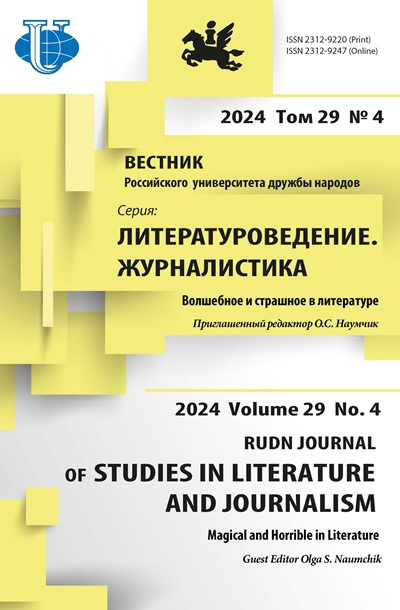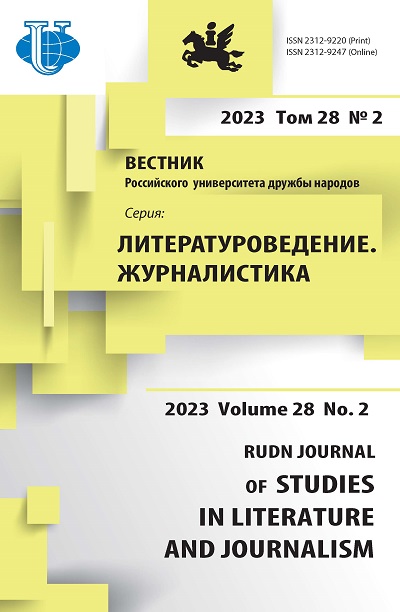Media strategies with lobbyists: government support for the IT industry
- Authors: Kotov A.A.1, Nigmatullina K.R.2, Polyakov M.L.3,4
-
Affiliations:
- RUDN University
- St. Petersburg University
- Russian Presidential Academy of National Economy and Public Administration
- MGIMO University
- Issue: Vol 28, No 2 (2023)
- Pages: 397-414
- Section: JOURNALISM
- URL: https://journals.rudn.ru/literary-criticism/article/view/35473
- DOI: https://doi.org/10.22363/2312-9220-2023-28-2-397-414
- EDN: https://elibrary.ru/HXZZCG
Cite item
Full Text
Abstract
The communication component of lobbying activity and the role of media communications in achieving lobbying goals are considered on the example of the formation of the legal field of the information technology (IT) industry in the conditions of 2022. As an empirical material, public content initiated by large associations defending the interests of the industry in the media field was chosen. The consistent communicative coupling of the IT industry with the activities of the Ministry of Digital Development, Communications and Mass Communications of the Russian Federation is shown. To analyze the lobbying process, the reputation management, media monitoring and social media system “SCAN-Interfax” was used. In relation to the topic of lobbying for IT interests, a gap in communication activity between the Ministry of Finance and industry associations in absolute terms was revealed. At the same time, in relative terms to the total number of mentions in the media, the efforts were comparable. The actualization of the media strategy of IT associations on the transfer of public merits to the regulator - the Ministry of Finance was found, while the conclusion was made about the effectiveness of lobbying efforts. Semantic analysis of the communication activity of a particular association demonstrated an algorithm for implementing the goals of mediatized lobbying.
Full Text
Источник: Интерфакс-СКАН.
Main media stories mentioning Information & Computer Technologies Industry Association (APKIT)
No. | Topic | Number of publications |
1 | Ministry for Digital Technology, Communication and Mass Media clarified the rules for providing new measures to support the IT industry | 26 |
2 | The government announced new measures to support Russian business | 17 |
3 | Demand for IT specialists has fallen sharply in Russia | 16 |
4 | Ministry for Digital Technology, Communication and Mass Media answers questions about measures to support the IT industry | 14 |
5 | Ministry for Digital Technology, Communication and Mass Media urged IT companies to fill out a form at State Services Portal | 9 |
6 | Russian software developers speak against the legalization of pirated software | 8 |
7 | Experts assessed the impact of concessional lending on software developers | 8 |
8 | The authorities will prepare a capital raising mechanism for fast-growing companies | 6 |
9 | IT specialists asked the Ministry for Digital Technology, Communication and Mass Media for support for 17 classes of software | 6 |
10 | The government discusses the idea of giving computer purchases to single buyer organization | 4 |
Source: Interfax-SCAN; compiled by the authors.
About the authors
Andrey A. Kotov
RUDN University
Author for correspondence.
Email: andres.kotov@yandex.ru
ORCID iD: 0000-0001-5311-494X
postgraduate student, Department of Mass Communications
6 Miklukho-Maklaya St, Moscow, 117198, Russian FederationKamilla R. Nigmatullina
St. Petersburg University
Email: k.nigmatulina@spbu.ru
ORCID iD: 0000-0002-9146-1712
Doctor of Political Sciences, Professor, Head of the Digital Media Communications Department, Graduate School of Journalism and Mass Communication
7-9 Universitetskaya Naberezhnaya, St Petersburg, 199034, Russian FederationMaksim L. Polyakov
Russian Presidential Academy of National Economy and Public Administration; MGIMO University
Email: polyakov-ml@ranepa.ru
ORCID iD: 0000-0001-6110-7045
Academic Director of Master Program “Digital Communications and New Media”, senior lecturer, Integrated Communications Department, Institute of Social Science, Russian Presidential Academy of National Economy and Public Administration; Professor of International Journalism Department, MGIMO University
82 Prospekt Vernadskogo, Moscow, 119571, Russian Federation; 76 Prospekt Vernadskogo, Moscow, 119454, Russian FederationReferences
- Achkasova, V.A., Mintusova, I.E., & Filatova O.G. (2023). GR and lobbying: Theory and technologies. Moscow: Yurait Publ. (In Russ.)
- Belousov, A.B. (2006). Discrete model of lobbyist communication. Polis. Political Studies, (4), 87–101. (In Russ.) https://doi.org/10.17976/jpps/2006.04.09
- Berg, K.T. (2009). Finding connections between lobbying. Public Relations and Advocacy, 3(3). Retrieved October 12, 2022, from https://epublications.marquette.edu/comm_fac/78
- Bykov, I.A. (2013). Network political communication: Theory, practice and research methods. St. Petersburg: SPbSUITD Publ. (In Russ.)
- De Bruycker, I., & Beyers, J. (2015). Balanced or biased? Interest groups and legislative lobbying in the European news media. Political Communication, 32(3), 453–474. https://doi.org/10.1080/10584609.2014.958259
- De Bruycker, I., & Beyers, J. (2018). Lobbying strategies and success: Inside and outside lobbying in European Union legislative politics. European Political Science Review, 11(1), 1–18. https://doi.org/10.1017/S1755773918000218
- Entman, R.M. (2007). Framing bias: Media in the distribution of power. Journal of Communication, 57(1), 163–173. https://doi.org/10.1111/j.1460-2466.2006.00336.x
- Feldman, P.Ya. (2015). Communication structure of lobbying activity. Communikology, 3(2), 59–66. (In Russ.)
- Figenschou, T., & Fredheim, N. (2019). Interest groups on social media: Four forms of networked advocacy. Journal of Public Affairs, 20(2). https://doi.org/10.1002/pa.2012
- Ihlen, Ø., Valentini, C., Davidson, S., & Shavit, A. (2020). Lobbying, the public interest, and democracy: Communication perspectives. Journal of Public Affairs, 20(2). https://doi.org/10.1002/pa.2091
- Kashpur, V.V., & Negrul, S.V. (2012). Participation activity in professional public unions and associations of small and medium business as a parameter of regional entrepreneurship subject potential. Tomsk State University Journal of Philosophy, Sociology and Political Science, 17(1), 129–140. (In Russ.)
- Mykkänen, M., & Ikonen, P. (2019). Media strategies in lobbying process. A literature review on publications in 2000‒2018. Academicus: International Scientific Journal, (20), 34–50. https://doi.org/10.7336/academicus.2019.20.03
- Shokhin, A.N., Bashirov, M.F., Borisov, S.R., Vorobiev, M.A., & Galperin, M.L. (2017). Business and authorities in Russia: Regulatory framework and compliance practices. Moscow: HSE University. (In Russ.)
- Strömbäck, J., & Van Aelst, P. (2013). Why political parties adapt to the media: Exploring the fourth dimension of mediatization. International Communication Gazette, 75(4), 341–358. https://doi.org/10.1177/1748048513482266
- Trapp, N.L., & Laursen, B. (2017). Inside out: Interest groups’ ‘outside’ media work as a means to manage ‘inside’ lobbying efforts and relationships with politicians. Interest Groups & Advocacy, 6, 143–160. https://doi.org/10.1057/s41309-017-0016-y
- Tresch, A., & Fischer, M. (2014). In search of political influence: Outside lobbying behaviour and media coverage of social movements, interest groups and political parties in six Western European countries. International Political Science Review, 36(4), 355–372. https://doi.org/10.1177/0192512113505627
- Ushanov, P.V. (2020). Lobbyism as a communication technology: Russian experience. Vestnik VSU. Series: Philology. Journalism, (2), 157–160. (In Russ.)
Supplementary files



















